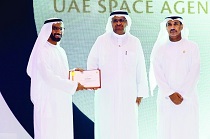Media Center
UAE launches national space policy
The UAE Space Agency issued the Arab world’s first national space policy in the capital on Tuesday – the first step to formulating laws for the industry.
"The policy is just like a torch guiding us to where we have to go," said Dr Mohammed Al Ahbabi, the agency’s director general.
"Our space laws will have elements designed for tomorrow’s technologies and industries, such as space tourism, and will address key issues including liability and insurance."
Development of laws for the space industry, which would be months away, was key to attracting foreign investment, one of the policy’s goals, said Dr Al Ahbabi.
Other aims include increasing the Emirati workforce, expanding and diversifying the economy, promoting domestic and international cooperation, and establishing the UAE as an international leader in the space industry. Dr Khalifa Al Romaithi, the agency’s chairman, said the policy would be a cornerstone in building a space sector that would enable the UAE to lead in many fields.
It has taken two years to develop the policy with the partnership of private and academic institutes.
Increasing the number of space engineering professionals was one of the policy’s top objectives, said Dr Al Ahbabi.
"Without the human capital the sector does not make sense. We are working to make the space field attractive," he said.
The agency will also be working with local universities to raise students’ awareness about the sector.
On Tuesday, it signed agreements with the New York University Abu Dhabi, University of Sharjah, Khalifa University, Zayed University, Masdar Institute of Science and Technology, UAE University and American University of Sharjah (AUS).
Dr Bjorn Kjerfve, chancellor of AUS, said he was pleased that his institution would be contributing to the industry.
"We graduate fantastic students in the engineering fields who we hope could contribute to the sector," he said.
"But if we could jointly develop a programme that provide avenues for employment, then we would put much more emphasis on space than we have now."
Dr Al Ahbabi said the policy would boost the sector’s growth following double-digit gains last year, and would continue the agency’s collaboration with other countries’ space programmes.
"We have signed agreements with all the major space agencies except those of Brazil and Argentina, which are coming next year," he said.
The leaders of the UAE’s space-related companies welcomed the policy and their inclusion in its formation.
"Today’s issuance of the national space policy is a further milestone toward the country’s vision and ambition to become one of the world’s main players in the space industry," said Masood Mahmood, chief executive of Yahsat.
The regulatory time frame is between next year and 2035, with policy reviews every five years.


